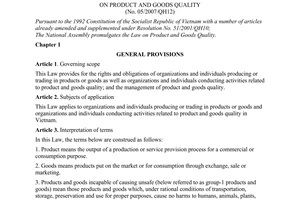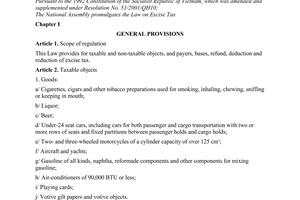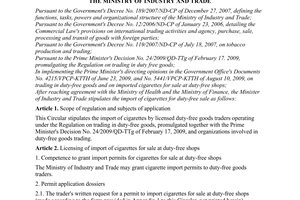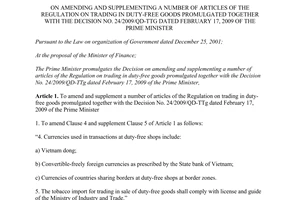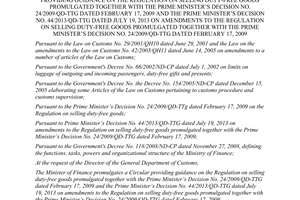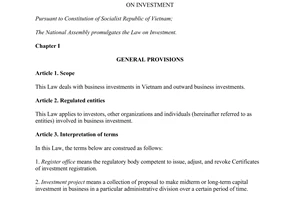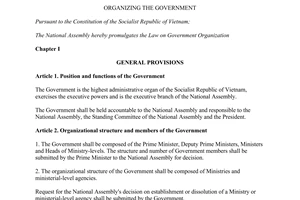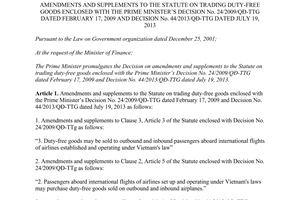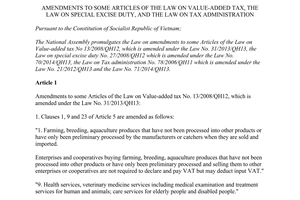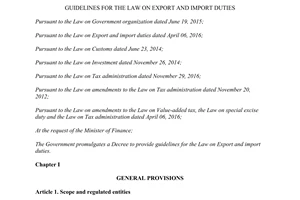Nội dung toàn văn Decree 167/2016/ND-CP on duty free business
|
THE GOVERNMENT |
SOCIALIST
REPUBLIC OF VIETNAM |
|
No.: 167/2016/ND-CP |
Hanoi, December 27, 2016 |
DECREE
ON DUTY-FREE BUSINESS
Pursuant to the Law on organization of the Government dated June 19, 2015;
Pursuant to the Law on import & export duties dated April 06, 2016;
Pursuant to the Law dated April 06, 2016 on amendments to some articles of the Law on value-added tax, the Law on special excise duty and the Law on tax administration;
Pursuant to the Law on value-added tax dated June 03, 2008 and the Law dated June 19, 2013 on amendments to some articles of the Law on value-added tax;
Pursuant to the Law on special excise duty dated November 14, 2008;
Pursuant to the Law dated November 26, 2014 on amendments to some articles of laws on taxation;
Pursuant to the Law on tax administration dated November 29, 2006;
Pursuant to the Law dated November 20, 2012 on amendments to some articles of the Law on tax administration;
Pursuant to the Law on customs dated June 23, 2014;
Pursuant to the Law on investment dated November 26, 2014;
Pursuant to the Law on quality of products and goods dated November 21, 2007;
Pursuant to the Law on food safety dated June 17, 2010;
At the request of Minister of Finance,
The Government promulgates a Decree on duty-free business.
Chapter I
GENERAL PROVISIONS
Article 1. Scope
This Decree introduces regulations on the management of duty-free business, consisting of: procedures for goods sold at duty-free shops, duty-free warehouses, customs supervision of duty-free goods transported between duty-free shops, between a duty-free warehouse and a duty-free shop, between a duty-free warehouse and an aircraft, supervision of transport of cash into and out of sterile areas or restricted area by duty-free goods traders (hereinafter referred to as traders), duty-free shop operations, and reports on duty-free goods to customs agencies.
Article 2. Regulated entities
This Decree applies to:
1. Outgoing, incoming and transit passengers.
2. Entities eligible for the privileges and immunities in Vietnam.
3. Seafarers working on seagoing ships operating on international routes.
4. Passengers on international flights arriving in and leaving Vietnam.
5. Enterprises eligible to trade in duty-free goods as regulated by prevailing laws.
6. Customs agencies and customs officials.
7. Entities operating in seaports, international civil airports, and international multimodal railway stations.
8. Management authorities of international border gate economic zones and entities in charge of managing international border gates.
9. Organizations having rights and obligations relating to duty-free shop operations.
10. Other regulatory bodies cooperating in state management of duty-free shop operations.
Chapter II
MANAGEMENT OF DUTY-FREE SHOP OPERATIONS
Article 3. Entities and eligibility requirements for buying duty-free goods
1. Outgoing or transit passengers who have completed departure or transit procedures, passengers on international flights departing from Vietnam or passengers waiting for departure may purchase duty-free goods. To be specific:
a) Outgoing or transit passengers through international land border checkpoints, or checkpoints at international multimodal railway stations, or Class-1 seaports, or international civil airports may purchase duty-free goods at duty-free shops located within in sterile areas; passengers on international flights departing from Vietnam may purchase duty-free goods on board aircrafts;
b) Passengers waiting for departure can shop at downtown duty-free shops. Passengers shall their purchases at duty-free pick-up counters in sterile areas at international border gates where they shall depart from;
c) Foreign travelers, who travel in groups by sea and hold valid passports or laissez-passers or shorepasses for outgoing/ incoming passengers as regulated without entry visa, or entry/exit declaration, may purchase duty-free items at Class-1 seaport border gates or downtown duty-free shops. Goods bought duty free shall be collected at ports of exit upon the traveler’s completion of exit procedures.
2. Passengers on an international flight arriving in Vietnam may purchase duty-free items on board the aircraft used in that international flight.
3. Incoming passengers may purchase duty-free items at duty-free shops located in restricted areas of international civil airports after they have completed entry procedures; they may not purchase duty-free items after they leave restricted areas of international civil airports.
4. Entities eligible for the privileges and immunities in Vietnam may purchase duty-free items at downtown duty-free shops. The duty-free allowance book must be presented if purchasing duty-free items for an organization. The duty-free allowance book and ID Card issued by Ministry of Foreign Affairs or Passport must be presented if purchasing duty-free items for an individual.
5. Seafarers working on board the seagoing ships operating on international routes (including foreign-flagged ships and Vietnamese-flagged ships operating on international routes) may purchase duty-free items at Class-1 seaports or downtown duty-free shops to serve personal needs or the everyday life of seafarers on board while the ship is anchored at a Vietnam's seaport or moves outside the Vietnam’s territorial waters.
a) A seafarer who wants to purchase duty-free items to server his/her personal needs must present a valid passport or shorepass;
b) If purchasing duty-free goods to serve the everyday life of all seafarers while the ship is anchored at a Vietnam’s seaport, the ship’s captain or representative shall present the order for duty-free items enclosed with the list of seafarers which indicates passport number of each seafarer. The ship number and date of entry must be included in the order;
c) If purchasing duty-free goods to serve the everyday life of all seafarers on board while the ship is on a voyage outside the Vietnam’s territorial waters, the ship’s captain or representative shall present the order for duty-free items which must specify the ship number and date of entry, and be enclosed with the list of seafarers which indicates passport number of each seafarer. The purchases must be stored in the ship’s hold, and sealed, certified and supervised by the customs agency at the port of exit until the ship leaves the port.
Article 4. Tax policies applied to goods sold in duty-free shops
1. Goods temporarily imported for sale in duty-free shops shall be exempted from import duty, and subject to neither special excise duty nor value-added tax.
2. Tax policies applied to goods produced in Vietnam and sold in duty-free shops shall be same as those applied to temporarily exported goods.
3. The overpayment of the paid import duty on goods imported and sold at duty-free shops shall be handled in accordance with regulations of the Law on tax administration.
Article 5. Line management of goods sold in duty-free shops
1. The import of tobacco products for sale in duty-free shops shall require a license granted by Ministry of Industry and Trade.
2. An application for a license to import tobacco products includes:
a) The application form for a license to import tobacco products for sale at duty-free shops made by the trader using the Form No. 03/CV enclosed herewith: 01 original;
b) The Certificate of eligibility to trade duty-free goods, or the Business Registration Certificate, or the Investment Certificate: 01 copy. In case of initial application, 01 copy of the Certificate of eligibility to trade duty-free goods must be submitted;
c) The report on the import, inventory and sale of tobacco products from the beginning of year to the time of application with the certification of the Customs Sub-department in charge of the applicant’s duty-free shop or warehouse using the Form No. 04/BCNKTKTL enclosed herewith: 01 original.
3. Licensing procedures and formalities
a) An application including all of documents prescribed in Clause 2 of this Article shall be, by hand or by post, submitted to the Ministry of Industry and Trade;
b) Processing period
Within 10 working days (following the Ministry of Industry and Trade’s seal of incoming document) as from the receipt of a valid application, the Ministry of Industry and Trade shall grant a license to import tobacco products for sale at duty-free shops to the applicant. If an application is refused, the Ministry of Industry and Trade shall specify reasons thereof in writing.
If an application is invalid, the Ministry of Industry and Trade shall, within 05 working days (following the Ministry of Industry and Trade’s seal of incoming document) as from the receipt of application, inform and request the applicant to supplement the application (by send a written notice, fax, email or call, etc.).
4. Each package of cigarettes which are imported to sell at duty-free shops must carry health warnings in Vietnamese or English in conformity with regulations of the law on prevention of harmful effects of tobacco use and the Framework Convention on Tobacco Control (FCTC).
5. Goods temporarily imported to sell at duty-free shops shall not be subject to the inspection of product quality, food safety and hygiene while carrying out procedures for temporary importation. Product quality, food safety and hygiene shall comply with regulations of prevailing laws.
6. Goods or products (which are temporarily imported, imported or produced domestically) of all materials with contents about culture, literature, arts or entertainment sold at duty-free shops shall be subject to the permission by a competent cultural agency, and must satisfy all of requirements on product quality as regulated by laws.
7. Traders shall assume responsibility before the law for the product quality, food safety and hygiene.
8. If an international treaty for line management to which Vietnam is a signatory introduces regulations on product quality or food safety with respect of goods sold at duty-free shops on contrary to regulations herein, such international treaty shall apply.
Article 6. Goods sold in duty-free shops
1. Goods sold in duty-free shops include: goods temporarily imported into Vietnam; goods produced in Vietnam; imported goods which may be sold in Vietnam upon the completion of import procedures in accordance with the law of Vietnam.
Goods sold in duty-free shops, which are goods produced in Vietnam or imported goods which may be sold in Vietnam upon the completion of import procedures in accordance with the law of Vietnam, must not be in the list of goods banned or suspended from export. If an item is subject to the conditional export, all of conditions for exporting such item must be satisfied as regulated by laws.
Goods temporarily imported to sell at duty-free shops must not be in the list of goods banned or suspended from import.
2. The management of goods sold at duty-free shops, including imported goods which may be sold in Vietnam upon the completion of import procedures in accordance with the law of Vietnam and goods produced in Vietnam, shall be governed by regulations on temporary exportation.
3. Goods sold at a duty-free shop must be stored in that duty-free shop or duty-free warehouse of the trader.
4. The storage period at duty-free shop shall comply with regulations in Point a Clause 2 Article 47 of the Law on customs No. 54/2014/QH13 dated June 23, 2014.
5. Tobacco, cigar and beer products must bear the stamp carrying the words “VIET NAM DUTY NOT PAID” issued by the Ministry of Finance. The location of the “VIET NAM DUTY NOT PAID” stamp shall follow regulations in the Appendix enclosed herewith. Goods must be stamped before they are displayed for sale in duty-free shops or before they are directly delivered from the duty-free warehouse to the buyers.
6. If goods temporarily imported for sale in duty-free shops are put into domestic consumption, policies on management of imported goods and taxation shall be applied at the time when a new customs declaration form is opened to put such imported goods into domestic consumption, except for the cases where all policies on management of imported goods and taxation have been applied at the registration time of initial customs declaration form.
7. If goods which are managed under regulations on temporary exportation are re-sold in domestic market, the trader must comply with laws on re-imported goods.
8. Damaged, degraded, low-quality or expired goods shall not be sold for consumption; the trader must make the written record of status of goods with certification of the Customs Sub-department in charge of the trader’s duty-free shop or warehouse, and destroy such goods under the supervision of customs agency. The destruction of goods must be performed before the expiry date of temporary importation/exportation declaration form (including the extension of temporary importation/ exportation).
9. The trader must manage product samples which are displayed in duty-free shop to serve customers’ test (perfume testing papers, sample wines and spirits, samples of cosmetics, perfume testers, etc.) in separate manner in conformity with using purposes, and submit final reports thereof to customs agency.
Article 7. Currencies paid for goods bought in duty-free shops
1. VND.
2. Freely convertible currencies.
3. The currency used by the country that shares the land border with Vietnam at the border region where the duty-free shop is located.
Article 8. Duty-free allowances
1. Outgoing or transit passengers, or passengers on international flights departing from Vietnam, or passengers waiting for departure prescribed in Clause 1 Article 3 herein may purchase duty-free goods with unlimited quantity and value provided they must assume responsibility for procedures and duty-free concession limits of their destinations.
2. Passengers on international flights arriving in Vietnam, and incoming passengers prescribed in Clauses 2 and 3 Article 3 herein may purchase duty-free items according to the duty-free allowances regulated in Clauses 1 and 2 Article 6 of the Government’s Decree No. 134/2016/ND-CP dated September 01, 2016 on guidelines for the Law on import and export duties.
3. The entities prescribed in Clause 4 Article 3 herein may purchase duty-free items according to the duty-free allowances regulated in Article 5 of the Government’s Decree No. 134/2016/ND-CP dated September 01, 2016 on guidelines for the Law on import and export duties.
4. The entities prescribed in Points a and b Clause 5 Article 3 herein may purchase duty-free items to serve personal needs or the everyday life of seafarers on board the seagoing ship operating on international routes while the ship is anchored at a seaport of Vietnam. Each time the ship is anchored at a seaport of Vietnam, each seafarer may purchase duty-free goods within the following duty-free allowances:
a) 1.5 liters of alcohol of ≥20% ABV, or 2.0 liters of alcohol of <20% ABV, or 3.0 liters of other alcoholic drinks or beer.
If a seafarer buys a bottle or can of alcohol whose volume exceeds the limit by not more than 01 liter, the whole bottle will be duty-free. If the volume exceeds the limit by more than 01 liter, the exceed amount shall be dutiable;
b) 200 cigarettes, or 250 gram of shredded tobacco, or 20 cigars;
5. The entities prescribed in Point c Clause 5 Article 3 herein may purchase duty-free goods with unlimited quantity and value to use on board the ship while the ship moves out of the territorial waters of Vietnam.
Chapter III
CUSTOMS PROCEDURES AND SUPERVISION OF DUTY-FREE SHOP OPERATIONS
Article 9. Customs procedures for goods sold in duty-free shops
1. Imported goods: The trader must carry out procedures for temporary importation in accordance with regulations in the Government’s Decree No. 08/2015/ND-CP dated January 21, 2015 providing specific provisions and guidance on enforcement of the Customs Law on customs procedures, examination, supervision and control procedures.
2. Goods produced in Vietnam, imported goods which may be sold in Vietnam upon the completion of import procedures in accordance with the law of Vietnam, and goods temporarily imported into Vietnam: The trader must carry out procedures for temporary exportation/ re-exportation in accordance with regulations in the Government’s Decree No. 08/2015/ND-CP dated January 21, 2015 providing specific provisions and guidance on enforcement of the Customs Law on customs procedures, examination, supervision and control procedures.
Article 10. Customs procedures and supervision of goods transported between duty-free warehouse and duty-free shop
1. If the duty-free warehouse and the duty-free shop are located at the same location, the trader shall assume responsibility to manage and monitor the transport of duty-free goods between its duty-free warehouse and its duty-free shop.
2. If a duty-free warehouse is located in the sterile area or restricted area far away from the location of the duty-free shop, then:
a) The trader must send goods-related information to the electronic data processing system before the transport of goods, and present vouchers of delivery of goods out of warehouse or shop when goods are transported between duty-free warehouse and duty-free shop. In case it is processed by hand or the electronic data processing system fails, the trader must inform the customs agency in writing of the goods transport and send goods-related data to the electronic data processing system within 24 hours after it has been remedied.
b) The customs sub-department in charge of the duty-free shop/ warehouse shall assume responsibility to conduct a physical inspection of transported goods on the risk management principle or when the trader denotes violations against prevailing laws. The customs agency shall grant approval for the trader's written notice of goods transport if the notice is made by hand or the electronic data processing system fails;
c) The customs sub-department in charge of the duty-free shop/warehouse shall inform (in writing, by email, call or fax, etc.) the trader of the restore of the electronic data processing system in a timely manner.
3. If a duty-free warehouse is located neither at the same location with the duty-free shop nor in the sterile or restricted area, then:
a) The trader shall send information (name of goods, quantity, and transport route) about the goods transport to the electronic data processing system before the transport of goods, and make one hard copy of such information to use as goods transport documents. If the notification is made by hand or the electronic data processing system fails, the trader shall inform the customs agency in writing of the goods transport and transport goods only after having obtained an approval from the customs agency. The trader must send goods-related information to the electronic data processing system within 24 hours after it has been remedied. The trader must transport goods to the registered location;
b) The customs sub-department in charge of the duty-free shop/warehouse shall assume responsibility to supervise the loading of goods on the vehicle to transport goods between duty-free warehouse and duty-free shop; grant approval for the trader’s transport of goods via the electronic data processing system immediately after receiving the trader’s notification sent electronically or by hand. Goods must be sealed before they are transported. The customs agency’s seal number must be specified on the trader’s hard copy. When goods arrive in the registered destination, the customs sub-department in charge of the duty-free shop/warehouse shall examine the seal, make certification on the trader’s hard copy and supervise the transport of goods into the duty-free warehouse or duty-free shop;
c) The customs sub-department in charge of the duty-free shop/warehouse shall comply with regulations in Point C Clause 2 of this Article.
Article 11. Customs procedures and supervision of goods transported between duty-free warehouse and aircraft to serve the sale of duty-free goods on board the aircraft used in international flights departing from or arriving in Vietnam
1. A duty-free goods trader shall assume responsibility to:
a) When transporting goods from the duty-free warehouse to an aircraft, make a delivery note which specifies the flight number, delivery time, name of goods, unit, quantity, and certification made by the trader, the airline and the customs agency;
b) Transmit information specified in the trader’s delivery note, including the flight number, delivery time, name of goods, unit, and quantity to the electronic data processing system;
c) Transport goods from the duty-free warehouse to the aircraft under the supervision of the customs sub-department in charge of the duty-free warehouse;
d) With regard to unsold goods from international flights, seal the duty-free cart before it is moved out of the aircraft;
dd) Make 02 statements of cash flow and foreign currency revenue earned from duty-free goods sold which include the flight-related information, name and position of money deliverer and receivers, type of currency, face value, quantity, and total amount. These statements must be presented to the customs agency for certification after receipt of money from the representative attendant. Contents of statements of cash flow and foreign currency shall be updated to the electronic data processing system.
2. The customs sub-department in charge of the duty-free warehouse shall assume responsibility to:
a) Supervise the loading of goods on the duty-free carts, affix the customs seal, and supervise the transport of goods to the aircraft entry door. Certify and specify the customs’ seal number on the delivery note made by the trader;
b) Supervise the movement of carts of unsold duty-free goods to the warehouse; supervise the transport of unsold goods to the warehouse and certify the trader's goods-received note;
c) Make certification of 02 statements of cash flow and foreign currency presented by the trader after the trader takes delivery of money from the representative attendant; retain 01 copy thereof and return the other to the trader; make certification on the electronic data processing system.
Article 12. Procedures for sale of duty-free goods to outgoing passengers, transit passengers, passengers on outgoing flights, travelers by sea, or seafarers who buy duty-free goods to serve their personal needs while the ship is anchored in a seaport of Vietnam
1. A shop employee who sells goods to outgoing or transit passengers at a sterile area shall assume responsibility to:
a) Request the buyer to present his/her passport or laissez-passer;
b) Enter following data relating buyers and goods sold into the trader’s software system.
Buyer’s information: The buyer's full name as specified in his/her passport or laissez-passer; the reference number of his/her passport or laissez-passer; nationality; the flight's reference number, the flight date on the Boarding pass if the buyer is an outgoing or transit passenger by plane; or the departure date if the buyer is an outgoing or transit passenger by rail or by ship; the ship's name and date of arrival if the buyer presents a shorepass.
Purchase-related information: Name of goods and calculation unit which must be exactly specified as per the temporary import declaration form; quantity and value of each item;
c) Transmit the said data to the electronic data processing system. If the electronic data processing system fails, the trader must send data to the electronic data processing system within 24 hours after it has been repaired;
d) Issue sales invoice (including price-pack deals, if any) as regulated;
dd) Retain sales invoices by date (if sales invoices are rolls, they shall be retained by roll).
2. A flight attendant who sells goods on board an aircraft shall assume responsibility to:
a) Request the buyer to present his/her passport;
b) When selling goods, the flight attendant must sufficiently write name of buyer, his/her passport number, nationality, the flight's reference number, the Boarding pass, name of goods, unit, quantity and value of goods on the sales invoice. Name of goods and calculation unit must be exactly specified as per the import declaration form;
c) Within 24 hours since the aircraft lands at the designated location as regulated (the flight to Vietnam), the trader must enter the following data into its software system, including: Name of buyer, his/her passport number, nationality, the flight's reference number, the boarding pass, name of goods and unit which must be exactly specified as per the import declaration form, quantity and value as per the sales invoice. The said data shall be sent to the electronic data processing system. If the electronic data processing system fails, the trader must send the said data to the electronic data processing system within 24 hours after it has been remedied.
3. A shop employee who sells goods to travelers by sea shall assume responsibility to:
a) Request the buyer to present his/her passport or laissez-passer of shorepass;
b) Enter data relating the buyers and their purchases into the trader’s software system.
Buyer’s information: The buyer's full name as per his/her passport or laissez-passer or shorepass; the reference number of his/her passport or laissez-passe or shorepass; nationality; departure date of ship; name of the ship and date of arrival at the port if a buyer presents his/her shorepass.
Purchase-related information: Name of goods and unit which must be exactly specified as per the import declaration form; quantity and value of each item;
c) Transmit the said data to the electronic data processing system. If the electronic data processing system fails, the trader must send data to the electronic data processing system within 24 hours after it has been repaired;
d) Issue sales invoice (including price-pack deals, if any) as regulated;
dd) Retain sales invoices by date (if sales invoices are rolls, they shall be retained by roll);
e) Deliver purchases to the buyer who is a traveler by sea on board the ship after he/she has completed exit procedures.
4. A shop employee who sells duty-free goods to seafarers to serve their personal needs while the ship is anchored in a seaport of Vietnam shall assume responsibility to:
a) Request the buyer to present his/her passport or shorepass;
b) Enter data relating buyers and their purchases into the trader’s software system.
Buyer’s information: The buyer’s full name as per his/her passport or shorepass; the reference number of his/her passport or laissez-passer or shorepass; nationality; departure date of the ship; or name of the ship and date of arrival at the port if the buyer presents his/her shorepass.
Purchase-related information: Name of goods and unit which must be exactly specified as per the import declaration form; quantity and value of each item;
c) Transmit the said data to the electronic data processing system. If the electronic data processing system fails, the trader must send data to the electronic data processing system within 24 hours after it has been repaired;
d) Issue sales invoice (including price-pack deals, if any) as regulated;
dd) Retain sales invoices by date (if sales invoices are rolls, they shall be retained by roll).
5. A customs sub-department in charge of the duty-free shop/ warehouse shall assume responsibility to:
a) Implement the regulations in Point c Clause 2 Article 10 herein;
b) Based on the risk management and signs of violation of law, carry out the inspection of duty-free selling activities by inspecting the trader’s software system, the electronic data processing system and observation camera system, or carry out physical inspection of the duty-free shop/ warehouse.
Article 13. Procedures for sale of duty-free goods to incoming passengers through checkpoints of international airports
1. A duty-free shop employee shall assume responsibility to:
a) Fulfill duties as prescribed in Clause 1 Article 12 herein;
b) If a buyer exceeds his/her duty-free allowance as regulated, the trader shall make 02 copies of the Notice of excess over duty free using the Form No. 01/PTBHVDM enclosed herewith, and send them to the customs agency at the point of entry (in writing and electronically). The trader shall receive and retain 01 copy of the Notice which is signed and sealed by the customs official at the point of entry. Particularly, the tobacco products may not be sold in excess of the duty-free allowance.
2. A buyer whose purchases exceed his/her duty-free allowance shall assume responsibility to declare and pay tax on his/her purchases in excess of the duty-free allowance with customs agency and submit relevant documents as regulated by laws.
3. A customs sub-department in charge of the duty-free shop/ warehouse shall assume responsibility to:
a) Implement the regulations in Point c Clause 2 Article 10 herein;
b) Based on the risk management and signs of violation of law, carry out the inspection of duty-free selling activities by inspecting the trader’s software system, the electronic data processing system and observation camera system, or carry out physical inspection of the duty-free shop/ warehouse.
c) Collect taxes and retain photocopies of documents prescribed in Clause 2 of this Article.
Article 14. Procedures for sale of duty-free goods to passengers on international flights to Vietnam
1. Responsibilities of sales staff (flight attendant) and trader:
a) Request the buyer to present his/her passport and Boarding pass;
b) When selling goods, the flight attendant must sufficiently record the following information: Name of buyer, his/her passport number, nationality, the flight's reference number, the Boarding pass, name of goods, unit, quantity and value of goods on the sales invoice. Name of goods and calculation unit must be exactly specified as per the import declaration form;
c) Within 24 hours since the aircraft lands at the designated location as regulated, the trader must enter the following data into its software system, including: Name of buyer, his/her passport number, nationality, the flight's reference number, departure date, name of goods, quantity, value, total quantity and total amount. The trader shall send the said data to the electronic data processing system. If the electronic data processing system fails, the trader must send the required data to the electronic data processing system within 24 hours after it has been repaired;
d) If a buyer exceeds his/her duty-free allowance as regulated, the trader shall make 02 copies of the Notice of excess over duty free using the Form No. 01/PTBHVDM enclosed herewith, and send them to the customs agency at the point of entry (in writing and electronically). The trader shall receive and retain 01 copy of the Notice which is signed and sealed by the customs official at the point of entry. Particularly, the tobacco products may not be sold in excess of the duty-free allowance.
2. A buyer whose purchases exceed his/her duty-free allowance shall assume responsibility to declare and pay tax on his/her purchases in excess of the duty-free allowance with customs agency and submit relevant documents as regulated by laws.
3. A customs sub-department in charge of the duty-free shop/ warehouse shall assume responsibility to:
a) Implement the regulations in Point c Clause 2 Article 10 herein;
b) Based on the risk management and signs of violation of law, carry out the inspection of duty-free selling activities by inspecting the trader’s software system, the electronic data processing system, or carry out physical inspection of the trader’s duty-free warehouse.
c) Collect taxes and retain photocopies of documents prescribed in Clause 2 of this Article.
Article 15. Procedures for sale of duty-free goods to passengers waiting for departure who shop at downtown duty-free shops
1. A shop employee shall assume responsibility to:
a) Comply with regulations in Clause 1 Article 12 herein, except for the updating of information about the buyer's date and time of departure;
b) Prepare the Delivery note using the Form No. 02/PGH enclosed herewith: 2 copies;
c) Send contents included in the delivery note to the electronic data processing system. If the electronic data processing system fails, the required data must be sent to the electronic data processing system within 24 hours after it has been repaired.
2. A trader shall assume responsibility to:
a) Transport and present the goods enclosed with 02 copies of the Delivery note to the customs agency at the checkpoint of exit in order to deliver the goods to the buyer in the sterile area at the departure lounge;
b) When the Customs Sub-department in charge of the duty-free shop/warehouse carries out an inspection but the trader fails to present the Delivery note which has been certified by the customs agency at the checkpoint of exit, the trader is obliged to fully pay taxes on the goods sold as taxes on imported goods in conformity with prevailing regulations.
3. A customs sub-department in charge of the duty-free shop/ warehouse shall assume responsibility to:
a) Monitor feedback about the delivery note certified by a customs official;
b) Implement the regulations in Point c Clause 2 Article 10 herein;
c) Based on the risk management and signs of violation of law, carry out the inspection of duty-free selling activities by checking the trader’s software system, the electronic data processing system and observation camera system, or carry out a physical inspection of the duty-free shop/ warehouse.
4. The customs sub-department at the checkpoint at the buyer’s departure place shall assume responsibility to:
a) Receive goods and delivery note presented by the employee of the downtown duty-free shop;
b) Check and compare the goods with contents specified in the delivery note;
c) Append signature and seal of the in-charge customs official on the delivery note;
d) Retain 01 copy of the certified delivery note, and return the other to the shop employee;
dd) Ending each working day (or shift), the customs official must make confirmation of certified delivery notes on the electronic data processing system. If the electronic data processing system fails, the certification of certified delivery notes on the electronic data processing system must be made within 24 hours after it has been repaired.
Article 16. Procedures for sale of duty-free goods to entities those are eligible for privileges and immunities to buy goods at downtown duty-free shops
1. A shop employee shall assume responsibility to:
a) Request the buyer to present the duty-free allowance book, except for the case where the competent agency has updated the information in the duty-free allowance book on the Vietnam National Single Window portal;
b) Input and send the information about the allowance for duty-free goods specified in the duty-free allowance book presented by the buyer or the duty-free allowance book-related data updated by the competent agency on the Vietnam National Single Window portal (if this is the first use of the duty-free allowance book) to the electronic data processing system;
c) Present the original duty-free allowance book to the customs agency for certifying the granted duty-free allowance on the system if the buyer is prescribed in Point a of this Clause;
d) Enter required information in the sales invoice into the trader’s software system. Send required data to the electronic data processing system, and receive the system reply. If the electronic data processing system fails, the required data must be sent to the electronic data processing system within 24 hours after it has been repaired;
dd) Issue sales invoice (including price-pack deals, if any) as regulated;
e) Cut stamps on the duty-free allowance book corresponding to goods sold if the buyer is prescribed in Point a of this Clause. If sales invoices are rolls, the trader shall retain stamps according to each sales invoice;
g) Retain sales invoices by date (if sales invoices are rolls, they shall be retained by roll).
2. Responsibilities of a customs sub-department in charge of the duty-free shop/ warehouse:
a) If the duty-free allowance is presented for the first time, the customs agency shall verify the original of the duty-free allowance book or verify the duty-free allowance on the Vietnam National Single Window portal, and record the quantity of goods which may be purchased by the buyer duty free on the system for monitoring the available duty-free allowance of that buyer;
b) Based on the risk management and signs of violation of law, the customs sub-department in charge of the duty-free shop/ warehouse shall carry out the inspection of duty-free selling activities by inspecting the trader’s software system, the electronic data processing system and observation camera system, or carry out a physical inspection at the duty-free shop/ warehouse.
c) The customs sub-department in charge of the duty-free shop/ warehouse shall implement the regulations in Point c Clause 2 Article 10 herein.
Article 17. Procedures for sale of duty-free goods to seafarers working on seagoing ships operating on international routes
1. When selling duty-free goods to seafarers to serve their everyday life on board the ship operating on international routes while the ship is anchored at a Vietnam's seaport, the shop employee shall assume responsibility to:
a) Request the buyer to present his/her passport, 01 original of the purchase order and 01 original of the list of seafarers;
b) Check the purchase order of the ship’s captain or representative, the list of seafarers and the duty-free allowance of each seafarer;
c) Enter the purchase order data into the trader’s software system and send required date to the electronic data processing system. If the electronic data processing system fails, the trader must send the required data to the electronic data processing system within 24 hours after it has been remedied;
d) Issue sales invoice (including the price-pack deals, if any) which must include the following information: full name, passport number and nationality of the ship’s captain or representative, the ship number and date of arrival;
dd) Retain sales invoice which has been signed by the ship’s captain or representative, the purchase order and the list of seafarers.
2. When selling duty-free goods to seafarers to serve their everyday life on board the ship operating on international routes while the ship is on the next voyage outside the Vietnam’s territorial waters, the shop employee shall assume responsibility to:
a) Request the buyer to present his/her passport, 01 original of the purchase order and 01 original of the list of seafarers;
b) Check the purchase order and the list of seafarers. Enter the information included in the sales invoice into the trader's software system, consisting of: the passport number and nationality of the ship’s captain or representative; the ship number and date of arrival; name of goods, quantity and value of each item. Send the said data to the electronic data processing system, and receive the system reply. If the electronic data processing system fails, the required data must be sent to the electronic data processing system within 24 hours after it has been repaired;
c) Issue sales invoice as regulated;
d) Assume responsibility to transport goods sold to the ship’s hold;
dd) Retain the sales invoice which has been signed by the ship’s captain or representative and certified by the official of the customs agency where procedures for the ship departure are carried out, the purchase order and the list of seafarers;
3. Responsibilities of a customs sub-department in charge of the duty-free shop/ warehouse:
a) Supervise goods from the time when they are purchased at a duty-free shop until they are subject to the supervision of the customs agency where procedures for ship departure are carried out;
b) Implement the regulations in Point c Clause 2 Article 10 herein.
4. The customs sub-department where procedures for ship departure are carried out shall assume responsibility to seal the ship's hold where purchased duty-free goods are stored, certify that goods have been dully supervised (the sales invoice is signed and sealed by the customs official), and supervise goods until the ship departs.
Article 18. Procedures for changing purpose of goods sold at duty-free shop
1. Form of changing purpose: Re-export, re-import or sale on domestic market.
2. Procedures for changing purpose of temporarily imported goods
a) The trader shall prepare and submit 01 original of the written request for re-export or re-import or sale for domestic consumption, which must specify each item of goods, the goods code, quantity, value and the number of temporary importation declaration form or temporary export declaration form;
b) Procedures for re-export, re-import or sale for domestic consumption shall be carried out in accordance with prevailing laws;
c) Policies on management of goods and taxation on goods put into domestic consumption shall be applied at the time when a customs declaration form is opened to change purpose of goods. Particularly, the tobacco products may not be sold for domestic consumption.
3. Regulations on re-imported goods shall be applied to goods produced in Vietnam and imported goods which may be sold in Vietnam upon the completion of import procedures in accordance with the law of Vietnam, which have been put into sale at duty-free shops and then put into domestic consumption. The “VIET NAM DUTY NOT PAID” stamps placed on each goods must be destroyed under the supervision of the customs sub-department in charge of the duty-free shop with a written record of the number of destroyed “VIET NAM DUTY NOT PAID” stamps.
Article 19. Procedures for destroyed goods and product samples
1. Damaged, degraded, low-quality or expired goods shall be handled in accordance with regulations in Clause 8 Article 6 herein:
a) The written record of damaged, degraded, low-quality or expired goods must include reasons thereof and the following information relating to goods: name of goods, goods code, quantity and value. Based on the written record and the physical inspection of goods, the customs official in charge of the duty-free shop shall certify the status of said goods by signing and appending the customs seal.
b) The trader must perform the destruction of goods in compliance with prevailing laws with the supervision of the in charge customs agency.
2. With respect of product samples displayed at a duty-free shop (excluding price-pack deals):
a) The trader must make and send the list of quantity and types of product samples which are displayed at the duty-free shop to the electronic data processing system, and receive the system reply;
b) Every month (within 07 first days of the month), the trader must prepare and send the report on the quantity of product samples provided to consumers and those in stock of the previous month to the electronic data processing system.
The in charge customs agency shall, within 03 working days, certify the trader’s report on the system if there is no doubt about the figures include in such report.
If the in charge customs agency suspects the report submitted by the trader, the customs agency shall, within 07 working days, inspect relevant documents and carry out a physical inspection of actual product samples in stock of the trader, where necessary. Based on the inspection results, the customs agency shall make certification of the trader’s reporting figures on the system.
Article 20. Procedures for transport of trader’s cash into or out of the sterile area or the restricted area
1. A trader shall assume responsibility to:
a) Send data using the Form No. 05/BKTMVRCL enclosed herewith to the electronic data processing system before the trader transports cash into or out of the sterile area;
b) Comply with the requirements of the customs agency via the system reply. The trader must present cash as requested by the customs agency.
2. Responsibilities of the customs agency:
a) When receiving the trader's statement and the system reply to the trader, the in charge customs official shall verify contents declared on the system;
b) Supervise the trader’s transport of cash into or out of the sterile area;
c) Carry out a physical inspection of cash transported into or out of the sterile area based on the application of principles for management of risks and signs of violation of law;
d) The customs official shall certify the cash transported through the supervision area on the system with respect of the cash transported into or out of the sterile area.
3. If the notice is made by hand or the electronic data processing system fails:
a) The enterprise shall make and submit 02 statements using the Form No. 05/BKTMVRCL enclosed herewith to the customs official for certification. The trader must present cash as requested by the customs agency. If the electronic data processing system fails, the trader must transmit information of the statement to the electronic data processing system within 24 hours after it has been repaired;
b) The customs agency shall assume responsibility to supervise the transport of cash into or out of the sterile area. A physical inspection of cash transported may be carried out based on the application of principles for management of risks and signs of violation of law. After the inspection of cash is completed (in case of physical inspection) or the cash has been transported through the supervision area, the customs official shall make certification on 02 statements presented by the trader, retain 01 copy and return the other to the trader.
Article 21. Final report on goods sold in duty-free shops
1. Time for submission of final report on goods sold in duty-free shops:
a) Annually, within 90 days after ending the financial year, the trader must submit the final report on the sale of duty-free goods in the financial year to the customs agency;
b) After submitting the annual final report, the trader may modify the contents of the submitted report provided that any modification must be made prior to the deadline for submission of final report and before the customs agency make notification of whether the inspection of trader's final report is made or not.
2. Location for submitting final report
The final report shall be submitted to the customs sub-department in charge of the duty-free shop/ warehouse or the customs sub-department at the place where the trader’s head office is located if a trader has several duty-free shops under the management of different customs sub-departments or provincial customs departments.
3. Trader’s responsibilities:
a) Submit the final report on goods sold at duty-free shop which is prepared according to the Input - Output - Inventory principle using Form No. 07/BCQT enclosed herewith to the customs agency via the electronic data processing system. The final report must be in conformity with the trader’s accounting vouchers. The trader may, by hand, submit 02 hard copies of the final report (the original);
b) Provide customs documents, accounting vouchers, accounting book, sales documents and other documents (if any) to serve the inspection of the trader’s final report as requested by the in charge customs agency.
4. The customs sub-department in charge of the duty-free shop/ warehouse shall receive the final report on sale of duty-free goods submitted by the trader and inspect the received report in compliance with regulations of this Article.
5. The inspection of final report shall be made in the following cases:
a) The final report is submitted by the trader for the first time;
b) There is a considerable difference between figures in the trader’s report and those recorded on the system of the customs agency which has been explained by the trader but still is not accepted by the customs agency;
c) The final report is inspected on the basis of application of risk management principle and assessment of the trader’s compliance with laws;
d) The inspection is made to inspect the final report of each duty-free shop if a trader has several duty-free shops under the management of different customs sub-departments or provincial customs departments.
6. Inspection contents
The following contents shall be inspected: customs documents, accounting documents and inventories at the duty-free shop/ warehouse. The trader must submit customs documents and/or accounting documents in which figures are not stored on the electronic data processing system or are different from figures stored on the electronic data processing system.
7. The power to decide the inspection
Director of the customs sub-department in charge of the duty-free shop/warehouse shall make decision and organize the inspection of trader's final report.
8. Inspection time
The customs agency shall inform the trader whose final report on sale of duty-free goods must be inspected of the inspection of final report within 20 days as from the receipt of such final report. The inspection must be finished within 05 working days since starting the inspection at the trader’s head office. Director of the customs sub-department may make decision on extension of inspection period provided it shall not exceed 05 working days.
9. Inspection procedures and formalities: The inspection of final report shall depend on the decision made by Director of the customs sub-department. Such decision must be sent to the trader within 03 days after it is dully signed and at least 05 working days prior to the inspection date. A written record of inspection contents shall be made and certified by the trader’s authorized representative and the inspection team. A decision on inspection of final report must include the following information: inspecting official, subject entity, time of starting and ending the inspection and the location where the inspection is performed.
10. Processing inspection results: Within 05 working days as from the completion of the inspection at the trader’s head office, the customs agency shall inform the inspection results to the trader, including satisfactory and unsatisfactory contents of the trader’s final report (if any) so that the trader can make explanation thereof.
a) If the inspection results indicate that the trader's final report matches with the accounting documents, accounting book or documents relating to traded duty-free goods, the customs agency shall make a written record of inspection results and make certification on the trader’s final report, and then update the inspection results on the system;
b) If the inspection results indicate that the trader's final report fails to match with the accounting documents, accounting book or documents relating to traded duty-free goods, the customs agency shall request the trader to provide explanation within 05 working days. If the trader’s explanation is accepted, the customs agency shall, within 05 working days, make a written record of inspection results and make certification on the trader’s final report, and then update the inspection results on the system;
c) In case the trader fails to make explanation or the trader’s explanation is not accepted by the trader, the customs agency shall, pursuant to the laws on taxation and customs and based on available documents, make decision on imposition of penalties for tax violation and administrative violation within their competence or request the competent officials to make decision in compliance with the law;
d) The written record of inspection results must include the following contents: Decision on inspection of final report, scope of inspection, inspection contents, opinions of the subject entity, conclusion on each inspection content, the severity of violation (if any), measures to handle violations, and suggestions of the inspection team.
11. If a final report is not subject to the inspection, the customs agency shall, within 10 working days as from the receipt of the trader’s final report, reply to the trader that the trader’s final report is accepted and not subject to the inspection, and at the same time make certification of the trader’s completion of final report on the system.
Article 22. Customs procedures for a trader who has several duty-free shops/ warehouses at different places under the management of different customs sub-departments or provincial customs departments
1. Trader’s responsibilities:
a) Carry out customs procedures for goods put into sale at duty-free shops in accordance with regulations by the customs sub-department at the place where the trader's head office is located;
b) Equip management software system for each duty-free shop/ warehouse which must be connected to the system of the customs sub-department in charge of the duty-free shop/ warehouse and the customs sub-department at the place where the trader’s head office is located so that all goods transported to the trader’s duty-free shops/ warehouses are managed;
c) If goods are moved from a duty-free shop or warehouse to another duty-free shop or warehouse under the management of another customs sub-department, the trader must prepare the goods-dispatch note as regulated with the following contents: The location of the duty-free shop or warehouse where goods are moved to, and the customs sub-department in charge of such duty-free shop or warehouse;
d) Assume responsibility to transport goods at its existing conditions to duty-free shops or warehouses specified in the goods-dispatch note;
dd) Submit the final report for each duty-free shop in accordance with regulations in Clauses 1 and 2 Article 21 herein to the customs sub-department in charge of such duty-free shop within 30 days from the ending day of the financial year. The trader may also submit such final report by hand. 03 hard copies of the trader's final report (the original) shall be submitted to the customs agency (01 copy is sent to the customs sub-department in charge of the duty-free shop, 01 is kept by such duty-free shop and the other is sent to the customs agency at the place where the trader’s head office is located);
e) Submit a general final report of the trader in accordance with regulations in Article 21 herein to the customs agency at the place where the trader’s head office is located. If the report is submitted by hand, the trader shall, in addition to the trader’s general final report, submit the final report of each duty-free shop with certification made by the customs sub-department in charge of such duty-free shop to affirm that such final report has been duly inspected;
g) Comply with regulations on inspection of final report mentioned in Article 21 herein.
2. The customs sub-department at the place where goods are moved out shall assume responsibility to:
a) Supervise the loading of goods on the mean of transport and affix the customs seal;
b) Based on the goods-dispatch note, prepare 02 written records of hand-over of duty-free goods transported under the customs supervision using the Form No. 06/BBBG enclosed herewith, and give them to the trader to submit to the customs sub-department in charge of the duty-free shop or warehouse where goods are moved in;
c) Monitor the goods moved out and take charge of finding goods if goods are not transported to the receiving place when the transport deadline is over.
3. The customs sub-department at the place where goods are moved in shall assume responsibility to:
a) Based on the written record made by the customs sub-department at the place where goods are moved out, supervise the transport of goods from the mean of transport into the duty-free shop or warehouse;
b) Make certification on 02 written records of hand-over of duty-free goods, delivery 01 copy thereof to the trader and the other to the customs sub-department at the place where goods are moved out;
c) Follow information about the goods transported and cooperate with the customs sub-department at the place where goods are moved out in finding goods if goods are not transported to the receiving place when the transport deadline is over.
4. A customs sub-department in charge of the duty-free shop/ warehouse shall assume responsibility to:
a) Receive and inspect the trader's final report, and send the inspection results and the inspected final report to the customs sub-department at the place where the trader's head office is located. The inspection must be completed within 45 days as from the submission of final report by the trader.
b) Carry out the inspection in accordance with regulations in Clauses 5, 6, 7, 8, 9 and 10 Article 21 herein.
5. The customs sub-department at the place where the trader's head office is located shall assume responsibility to:
a) Receive the final report of each duty-free shop and the general final report of the trader, and the inspection results of the customs sub-department in charge of each duty-free shop;
b) Check the rationality between final reports of duty-free shops, the rationality between the reporting figures and those stored on the electronic data processing system. Make certification on the general final report of the trader. If the figures reported by the trader fail to match with those on the system, the customs sub-department at the place where the trader’s head office is located shall send an official dispatch to the customs sub-department in charge of the duty-free shop or warehouse whose final report contains unsatisfactory figures. A complex case shall be reported to the leader of the provincial customs department in order to report to the General Department of Customs to establish and inspection team and carry out inspection of duty-free shops/warehouses of the trader.
Article 23. Responsibilities of buyers of duty-free goods prescribed in Article 3 herein
1. When buying duty-free goods, a buy must present and provide necessary information as prescribed in this Decree. The buyer is not allowed to give permission to another person to use his/her passport or duty-free allowance.
2. If the purchases of a buyer exceed his/her duty-free allowance, he/she must fulfill tax obligations and comply with policies on imported goods with the in charge customs agency.
Article 24. Cooperation between entities operating in seaports, international civil airports, and international multimodal railway stations, Management authorities of international border gate economic zones, entities in charge of managing international border gates, duty-free goods traders and customs agencies
1. Customs sub-department in charge of duty-free shops/ warehouses shall carry out an agreement with the entities operating in seaports, international civil airports, and international multimodal railway stations, the management authorities of international border gate economic zones, and entities in charge of managing international border gates on the locations where the customs supervision of goods and cash transported into or out of sterile areas or restricted areas shall be made.
2. Duty-free goods traders shall inform customs sub-departments in charge of duty-free shops/ warehouses of the list of persons in charge of transporting goods and cash into or out of sterile areas or restricted areas and the list of shop employees for the purpose of meetings requirements for customs supervision.
Chapter IV
IMPLEMENTATION
Article 25. Effect
1. This Decree shall come into force as from February 15, 2017.
2. The following documents are abrogated:
a) Decision No. 24/2009/QD-TTg dated February 17, 2009 by the Prime Minister promulgating Regulation on duty-free business;
b) Decision No. 44/2013/QD-TTg dated July 19, 2013 by the Prime Minister on amendments to some articles of Regulation on duty-free business enclosed to Decision No. 24/2009/QD-TTg dated February 17, 2009 by the Prime Minister;
c) Decision No. 39/2015/QD-TTg dated September 11, 2015 by the Prime Minister on amendments to some articles of Regulation on duty-free business enclosed to Decision No. 24/2009/QD-TTg dated February 17, 2009 and Decision No. 44/2013/QD-TTg dated July 19, 2013 by the Prime Minister;
d) Circular No. 148/2013/TT-BTC dated October 25, 2013 by Minister of Finance guiding the implementation of Regulation on duty-free business enclosed to Decision No. 24/2009/QD-TTg dated February 17, 2009 by the Prime Minister and Decision No. 44/2013/QD-TTg dated July 19, 2013 on amendments to some articles of Regulation on duty-free business enclosed to Decision No. 24/2009/QD-TTg dated February 17, 2009 by the Prime Minister;
dd) Circular No. 207/2015/TT-BTC dated December 25, 2015 by Minister of Finance on amendments to the Circular No. 148/2013/TT-BTC dated October 25, 2013 by Minister of Finance guiding the implementation of Regulation on duty-free business enclosed to Decision No. 24/2009/QD-TTg dated February 17, 2009 by the Prime Minister and Decision No. 44/2013/QD-TTg dated July 19, 2013 on amendments to some articles of Regulation on duty-free business enclosed to Decision No. 24/2009/QD-TTg dated February 17, 2009 by the Prime Minister;
e) Circular No. 02/2010/TT-BCT dated January 14, 2010 by Minister of Industry and Trade providing for the import of tobacco to serve duty-free business.
Article 26. Transitional clause
With respect to goods sold at duty-free shops under temporary importation/ exportation declaration forms before the entry into force of this Decree, duty-free goods traders shall carry out liquidation for such goods in conformity with regulations in the Circular No. Circular No. 148/2013/TT-BTC dated October 25, 2013 by Minister of Finance guiding the implementation of Regulation on duty-free business enclosed to Decision No. 24/2009/QD-TTg dated February 17, 2009 by the Prime Minister and Decision No. 44/2013/QD-TTg dated July 19, 2013 on amendments to some articles of Regulation on duty-free business enclosed to Decision No. 24/2009/QD-TTg dated February 17, 2009 by the Prime Minister.
Article 27. Responsibility for implementation
1. Ministry of Finance shall assume responsibility to set up the electronic data processing system to receive, process and monitor goods imported, exported and sold at duty-free shops, and respond to queries concerning duty-free business activities.
2. Ministries shall, based on their functions and duties, provide guidelines for the inspection of quality of products/goods and food safety with respect of temporarily imported goods granted customs clearance to be sold at duty-free shops.
3. Ministers, heads of ministerial-level agencies, heads of the Government's affiliates, and Chairpersons of people's committees of provinces/central-affiliated cities shall implement this Decree./.
|
|
ON BEHALF OF
THE GOVERNMENT |
------------------------------------------------------------------------------------------------------
This translation is made by LawSoft and
for reference purposes only. Its copyright is owned by LawSoft
and protected under Clause 2, Article 14 of the Law on Intellectual Property.Your comments are always welcomed

